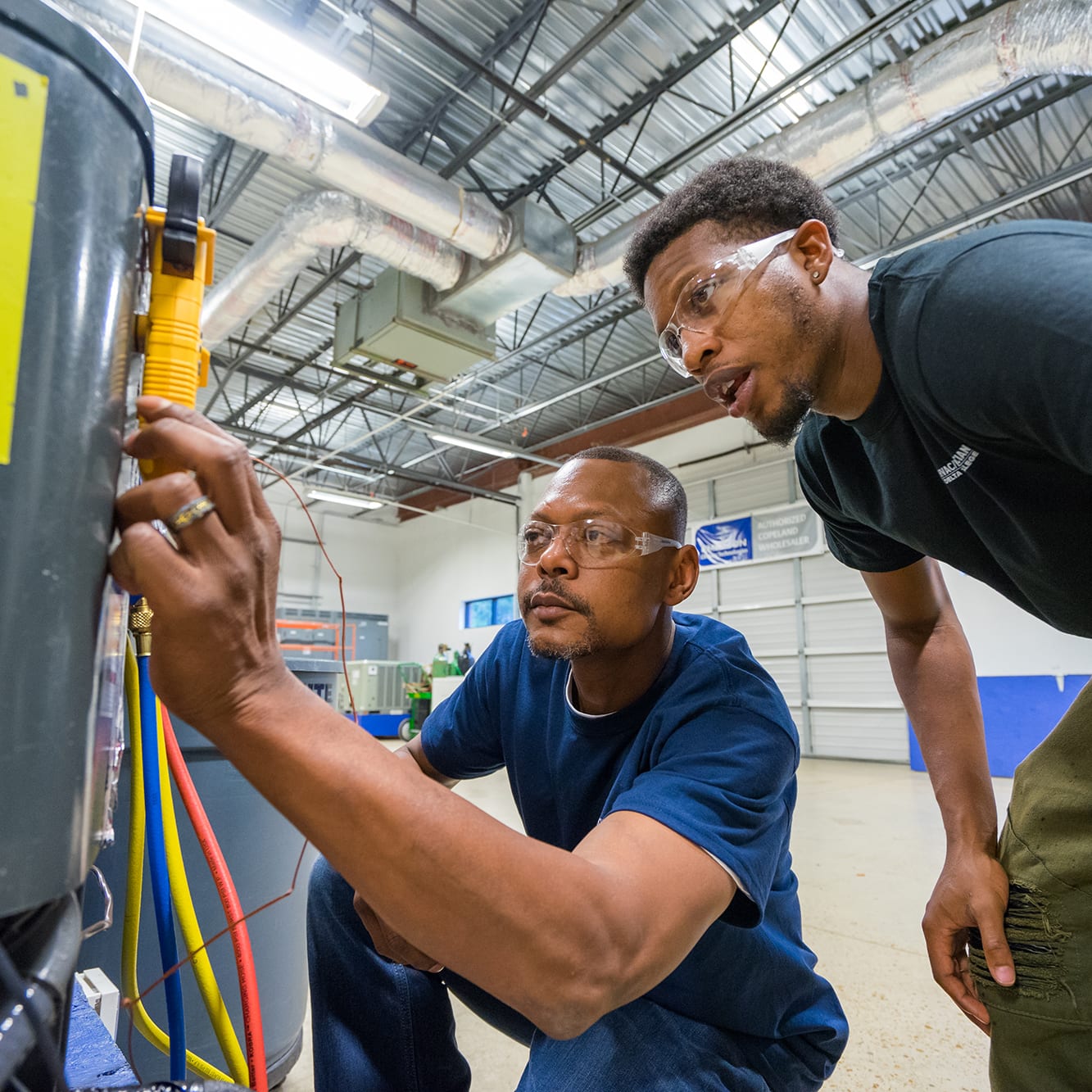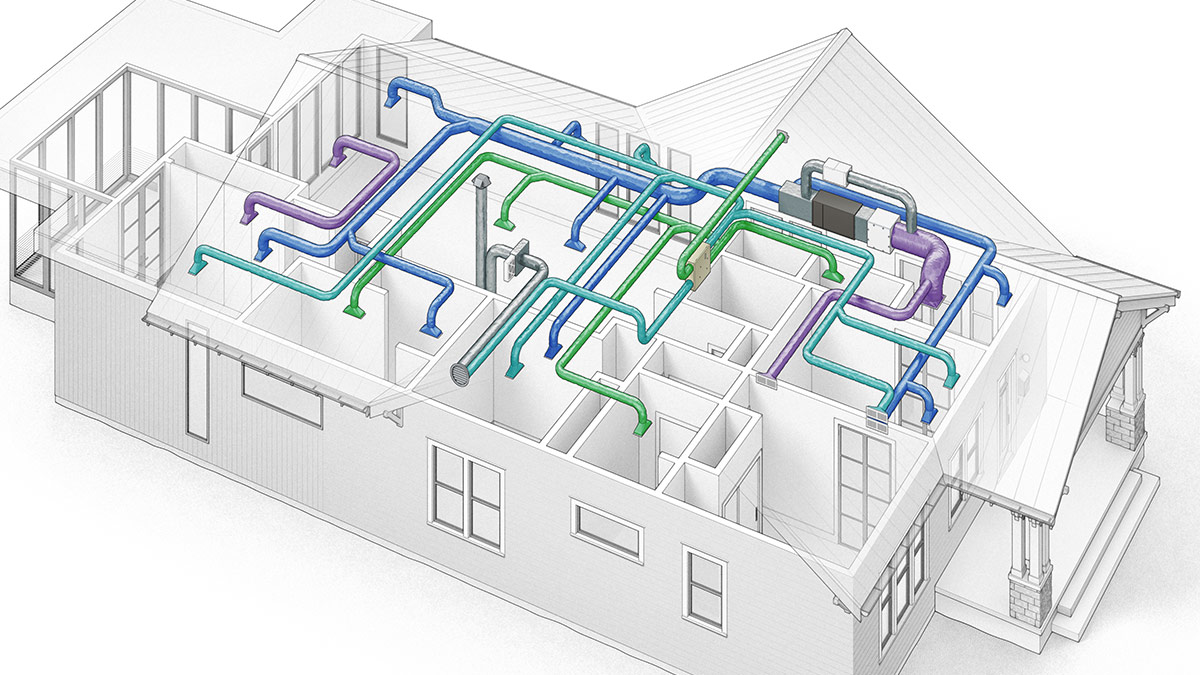Explore how HVAC experts provide fast checkup options
Wiki Article
Checking Out the Crucial Components of an Effective Cooling And Heating System
An efficient a/c system is improved numerous important elements that operate in consistency. Each part, from the thermostat to the ductwork, plays an essential function in preserving convenience and energy efficiency. Understanding these components is vital for optimizing performance and enhancing indoor air top quality. As one checks out these components, the intricate relationships between them expose understandings into boosting overall system efficiency. What specific variables add most to this performance?The Role of the Thermostat in HVAC Efficiency

Usually neglected, the thermostat plays an essential function in the efficiency of HVAC systems. This tiny tool functions as the key nerve center, regulating temperature settings and ensuring excellent convenience within an area. By properly noticing the ambient temperature level, the thermostat connects with the ventilation, home heating, and air conditioning systems to preserve the desired environment
An effective thermostat minimizes energy intake by activating the heating and cooling system only when needed, thus avoiding excessive home heating or air conditioning. Modern programmable and smart thermostats enhance this effectiveness better by allowing users to set timetables and from another location adjust settings, adapting to everyday regimens.
Furthermore, the placement of the thermostat is important; improper area can lead to imprecise temperature level analyses, leading to inefficient procedure. On the whole, a well-functioning thermostat not just enhances convenience yet also contributes substantially to power savings and the longevity of the a/c system.
Recognizing the Relevance of Air Filters
Air filters offer an important function in cooling and heating systems by guaranteeing that the air flowing within a room continues to be clean and healthy. These filters catch dirt, irritants, and various other toxins, stopping them from being recirculated throughout the setting. By catching these particles, air filters add to boosted interior air high quality, which can greatly profit residents' wellness, specifically those with allergic reactions or respiratory problems.Additionally, maintaining tidy air filters enhances the efficiency of heating and cooling systems. Clogged up filters can restrict air flow, triggering the system to function tougher to preserve wanted temperature levels, resulting in boosted energy consumption and higher energy costs. On a regular basis changing or cleaning up filters is a crucial maintenance step that can lengthen the life-span of heating and cooling tools. Eventually, understanding the importance of air filters enables house owners and building supervisors to take aggressive actions to ensure a well-functioning, efficient cooling and heating system that promotes a comfy and safe interior setting.

The Performance of the Heating System and Warm Pump
Heaters and warm pumps are critical components of HVAC systems, in charge of supplying warmth during chillier months. Furnaces operate by heating air through combustion or electrical resistance, then distributing it throughout the home using ducts. They generally use rapid home heating and can be fueled by gas, electricity, or oil, depending upon the system type.Alternatively, heat pumps move heat instead than produce it. They extract warmth from the outside air or ground, even in low temperatures, and transfer it inside your home. HVAC experts. This double performance permits heatpump to also give cooling in warmer months, making them functional options for year-round climate control
Both systems need proper maintenance to assure effectiveness and longevity. While furnaces stand out in severe cool, heat pumps can be beneficial in moderate environments. Comprehending their distinctive capabilities help home owners in selecting one of the most appropriate alternative for their home heating needs.
Discovering the A/c System
The air conditioning device is a crucial part of cooling and heating systems, offered in different kinds to match various requirements. Recognizing the efficiency scores of these units is crucial for making informed choices regarding power usage and cost. This section will explore the diverse kinds of air conditioning system and make clear just how effectiveness rankings influence efficiency.Kinds of Air Conditioners
While various variables affect the selection of air conditioning systems, understanding the various types offered is essential for house owners and building supervisors alike. Central air conditioners are created to cool down whole homes or buildings, making use of a network of air ducts for airflow. Window systems use an even more local service, ideal for single rooms or tiny spaces. Mobile air conditioning unit offer versatility, allowing customers to relocate the device as needed. Ductless mini-split systems are an additional alternative, incorporating the performance of main systems with the convenience of zoning, as they call for no ductwork. Geothermal systems harness the planet's temperature for energy-efficient cooling. Each type features distinctive advantages, making informed options essential for reliable climate control.
Performance Rankings Discussed
Comprehending efficiency rankings is necessary for selecting the right air conditioning unit, as these metrics supply understanding into the system's performance and power consumption. The most typical rating for air conditioning unit is the Seasonal Power Efficiency Ratio (SEER), which gauges the cooling outcome during a typical air conditioning season divided by the total electrical energy input. A higher SEER shows far better performance. Additionally, the Power Efficiency Proportion (EER) is utilized for gauging performance under specific conditions. One more vital metric is the Energy Star accreditation, which indicates that an unit satisfies strict energy efficiency standards. By evaluating these ratings, consumers can make informed selections that not just optimize convenience yet also lower power expenses and environmental influence.The Value of Ductwork and Air flow
Reliable ductwork style and air flow administration play essential functions in the general performance and efficiency of a/c systems. Proper ductwork warranties that conditioned air is dispersed evenly throughout a room, minimizing temperature fluctuations and enhancing convenience. Properly designed ducts reduce resistance to air flow, minimizing the workload on a/c equipment and inevitably reducing energy intake.Airflow monitoring involves tactically placing vents and signs up to boost the circulation of air. This prevents usual problems such as chilly or hot spots, which can occur when air flow is obstructed or inadequately well balanced. Additionally, the best duct products and insulation can even more improve performance by decreasing warmth loss or gain during air transportation.
An efficient ductwork system not only adds to power cost savings but can also lengthen the lifespan of heating and cooling tools by lowering unnecessary pressure (HVAC experts). Consequently, recognizing the relevance of ductwork and air flow is crucial for achieving peak a/c system performance
Regular Maintenance Practices to Boost Performance
Normal maintenance practices are essential for ensuring peak performance of a/c systems. These methods consist of routine examinations, cleansing, and required repairs to maintain the system read more running efficiently. Regularly altering air filters is important, as clogged up filters can obstruct air flow and lower performance. Additionally, specialists must check and clean evaporator and condenser coils to avoid getting too hot and energy wastefulness.Yearly specialist assessments are additionally advised, as skilled professionals can determine potential problems prior to they escalate. Lubing moving parts decreases wear and tear, adding to a much longer life-span for the system. Furthermore, ensuring that the thermostat functions properly help in maintaining perfect temperature level control.

Frequently Asked Concerns
Just how Frequently Should I Replace My Thermostat?
Thermostats need to generally be changed every 5 to one decade, relying on use and technology developments. Regular checks are suggested to ensure peak performance, especially if experiencing irregular temperature level control or raised power expenses.What Size Air Filter Is Best for My A/c System?
The very best dimension air filter for a cooling and heating system varies by unit style. Commonly, it's essential to seek advice from the owner's guidebook or examine the existing filter dimensions to ensure peak efficiency and air top quality.Can I Install a Warmth Pump Myself?
Installing a heat pump independently is feasible for knowledgeable individuals, but it requires expertise of regional codes and electrical systems. Employing a specialist is advised to assure proper installment and optimal system performance.Just how Do I Know if My Ductwork Is Reliable?
To figure out ductwork efficiency, one need to look for leakages, step air flow at vents, evaluate insulation high quality, and assess temperature distinctions between supply and return ducts. Specialist evaluations can supply thorough understandings right into general performance.What Are Signs My Heating And Cooling Demands Immediate Upkeep?
Indications that an a/c system needs immediate upkeep include unusual noises, irregular temperatures, enhanced power costs, undesirable odors, and regular cycling. Resolving these problems promptly can avoid additional damage and assurance peak system efficiency.Air filters offer an important feature in Cooling and heating systems by assuring that the air flowing within an area continues to be clean and healthy and balanced. Furthermore, maintaining tidy air filters enhances the efficiency of Cooling and heating systems. Ductless mini-split systems are one more alternative, integrating the performance of main systems with the convenience of zoning, as they require no ductwork. Comprehending efficiency rankings is essential for choosing the ideal air conditioning unit, as these metrics offer understanding into the system's performance and energy intake. The finest size air filter for a HVAC system differs by device layout.
Report this wiki page